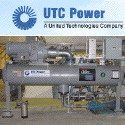Blog Archives
More Small Wind
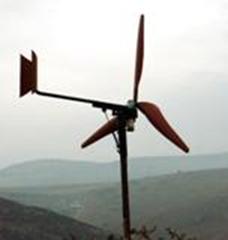
Attribution: TechnoSpin
Small wind seems to be gaining momentum. Recently, TechnoSpin secured an $8M Series A investment to scale up the manufacture of their line of small-scale wind turbines. The technical breakthrough for Technospin was in blade design leading to cut in and production at slower speeds than traditional turbines (3-4/m/sec range.)
The company offers 4 variations of turbine with rotor diameters ranging from 1.2 to 6m and peak power output ranging from 0.2 to 3.8kW. Two distinct offers from the company include the SeaSpin microturbine for electricity production in maritime environments and WaterSpin, a pumping microturbine for agricultural environments. The other two offers are for residential and small business use for straight electricity generation.
We will be curious to see how the small wind segment shakes out, there are clearly opportunities here if a company can hit the right price/performance/convenience ratio.
CleanTech Conference: Big Solar
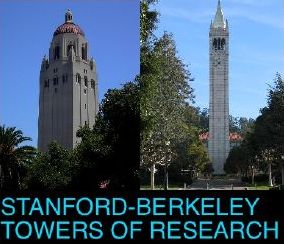
May 7th, 2008 brings on the second annual Berkeley-Stanford CleanTech Conference: Big Solar. The goal of the conference is to bring members of the academia, policy and business communities together to:
- Provide a multi-dimensional perspective on the opportunities and challenges in various clean technology sectors
- Attract, integrate, and cross pollinate projects and ideas between the Business and Engineering schools
- Create a framework from which innovation will breed into next generation Clean Technology
The event will feature panelists from PG&E, MMA Renewable Ventures, SunPower Corp., Wilson Sonsini Goodrich & Rosati, GreenVolts, Cool Earth Solar, Suntech and Cal SIEA.
This conference is taking place in May 7th from 12:00pm to 7pm a the SRI International auditorium (333 Ravenswood Ave, Menlo Park). Registration costs are $15 for Berkeley and Stanford students and $60 for non-students.
For more information, please visit their website.
More Land Open for Exploration
Both Australia and the US have started processes to open more land for geothermal exploration.
In Australia, the state of Victoria has opened 19 areas totaling more than 154,000 square kilometers. This augments the existing 12 licenses covering 74,000 square kilometers over 13 different exploration areas. Victoria has a target to harvest 10% of their energy needs from renewable sources by 2016 and geothermal harvest is key to that plan.
In the US, the Bureau of Land Management (BLM) has implemented its new process to expedite the nomination and subsequent competitive bidding for geothermal leases. In order to nominate a parcel, an application (Department of the Interior BLM Form 3203-1) is filed describing the tract along with a $100 fee plus $0.10 per acre. Nominations have been accepted in Nevada, Oregon, Utah, California, and Montana.
Oregon and Washington will be holding a competitive geothermal lease sale, tentatively scheduled for June 12. California and Nevada are currently planning a sale for July 15.
HFR, It’s Hot
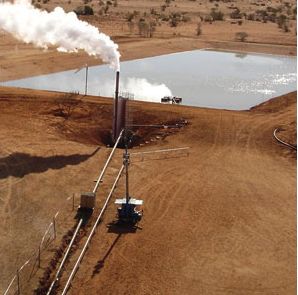
Attribution: Geodynamics
For those of you not in the know, HFR is hot fractured rock. The latest incarnation of HDR (hot dry rock) or EGS (enhanced geothermal system.) Pioneered in the early 1970’s at the Fenton Hill, New Mexico site, HDR is the process of introducing water into a known hot rock bed, inducing fractures in that rock bed to create a reservoir, and then harvesting the steam that results from the contact between the super hot rocks and the water through production wells.
The Fenton Hill project was shut down years ago, but the concept has taken on new life in Australia where no fewer than 32 companies are now working in the Cooper Basin to find a way to mine the heat, convert it to electric power, and transmit it to consumers.
Here in the US, the HFR et al view was featured prominently in an exhaustive report assembled by MIT and published last year stating that if commercial drilling could cost effectively reach the 10km depth, over 100,000MWe of geothermal electricity generation would be accessible to harvest. Australia though, is really taking this to heart as the Cooper Basin is an enormous, known hot granite area with temperatures in excess of 250C at 4km depth. Also, the basin has a “cap rock” geology, meaning that once a system is stimulated, the steam won’t leak to the surface, it needs a clear path, the kind that is created by drilling a production well.
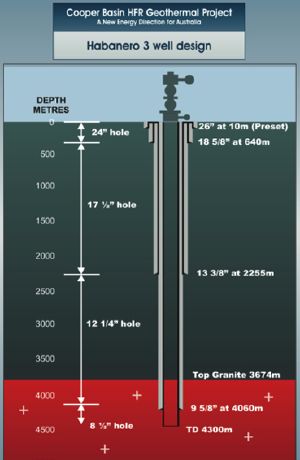
Attribution: Geodynamics
Geodynamics, Limited is a leader in working HFR project toward commercial viability and operation. To date, Geodynamics has drilled three deep wells, Habanero 1, 2, and 3 to depths of over 4km. Recently the company announced that it had been able to successfully inject water into the reservoir, increase the fracture size, and produce steam at pressures of over 14MPa (~2,000 psi) and flow rates of 27kg/second. This is sufficient to supply their 1MWe test harvest plant planned for installation and operation this year.
The next step for Geodynamics is to drill 9 wells (4 injection and 5 production) to supply a 50MWe electricity generation facility and advance the transmission projects to bring the power to market. Finally, the company plans to scale up by adding nine more 50MWe facilities, bringing the project’s total output to 500MWe by 2016.
While this is a great vision and by all accounts, Geodynamics and others are making progress toward realizing the vision, there are challenges and risks. One of the biggest challenges and risks has to do with “connectivity” – which means, when water is injected into the reservoir, is the steam from the injected water coming back out? And if so, how much of the injected water is being recovered as usable steam? These fractures aren’t highly controllable and thus in most HFR projects there is a significant shortfall between mass of injected fluid and mass of recovered steam.
Also, in this area of Australia, water is a scarce resource. Since the reservoirs that do exist in the rock naturally are not of production quality and there is little chance of refresh, the gamble is on the water in a relatively shallow aquifer holding out while Geodynamics and other companies compete for the water resource.
Even with the challenges and risks, this is an exciting and vital segment of the geothermal industry.
HT: Bruce Wilcox
New Mexico Geothermal WG Meeting

Comments are off for this postDate: Tuesday, May 13, 2008
Location: Porter Hall, Wendell Chino Building, 1220 South Saint Francis, Santa Fe, NM
Time: 8:00am – 4:30pmMeeting Overview:
This meeting will provide a forum on the exchange of information concerning the development of geothermal energy projects in New Mexico. Topics include but are not limited to: Ground Source Heat Pump Technology, Direct Use, District Heating Applications and Electricity Production.
Specific Goals of the Meeting Include:
➢ Updates on Strategic Planning action items for the working group
➢ Status of geothermal projects in NM
➢ Identify and discuss challenges concerning geothermal development in NM
➢ Sustainability of GSHP systems
➢ Discussion of drilling techniques and costsTentative Schedule:
8:00am — Sign in, Welcome
8:30am – Noon — Presentations
Noon – 1:30pm — Lunch on your own
1:30 – 2:30pm — Presentations
2:30 – 4:00pm — Round Table Topics
4:00 – 4:30pm — Action Items, AdjournInformation and Questions:
Steve Lucero 505.476.3324
stephen.lucero@state.nm.us



